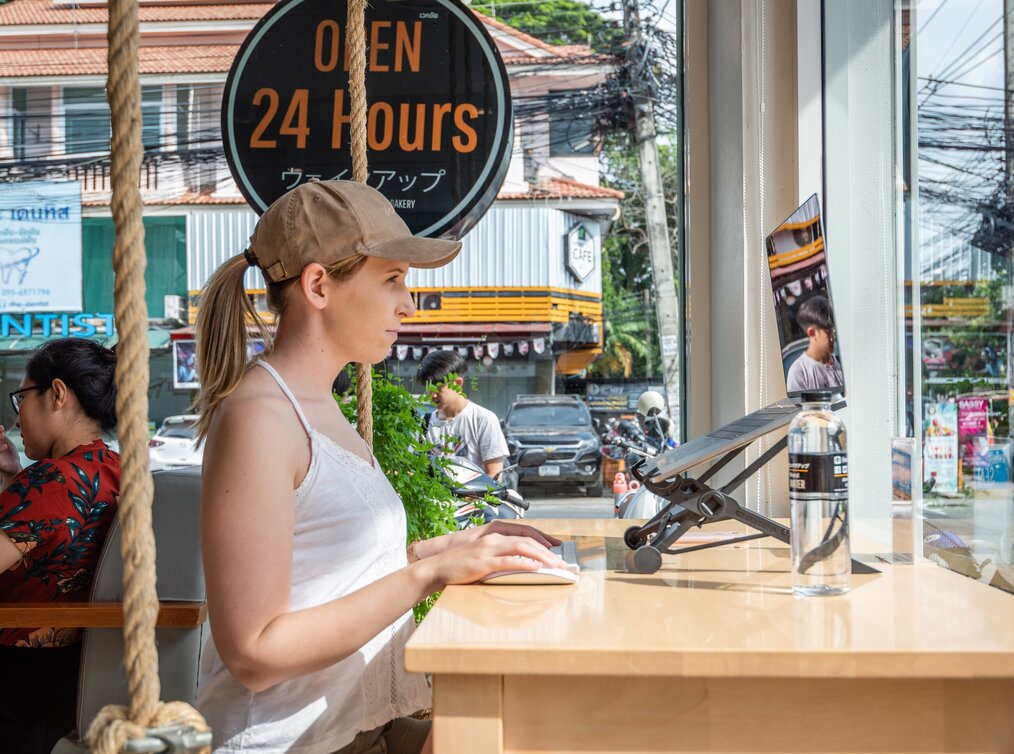
How to Become a Digital Nomad in 2023
Dreaming of working wherever and whenever you want? Consider becoming a digital nomad! Read on to learn more about what it means to be a digital nomad and how to become one yourself in 2023.

Who here hasn't dreamed of, or at least thought about once or twice, the possibility to work and live where you want? I think everybody has at least a few times, right? And why even stop here? Why not live and work wherever you want? Sounds like crazy talk, right? Not so much anymore these days.
Working as a digital nomad is an exciting lifestyle to live. The idea that you can work from anywhere globally, as long as you have a stable internet connection and a laptop, sounds like a dream to many. As a result, it’s become quite popular in the last decade!
With COVID-19 changing the way businesses operate, more people may be looking for opportunities to create online businesses and travel the world in 2023 and beyond.
What is a digital nomad?
Generally speaking, a digital nomad is someone who works remotely, giving them the freedom to live anywhere in the world.
This term can be applied to anyone who has an online job that allows them to work remotely. Hence, it's not a specific job title like accountant or content writer. Likewise, "nomad" isn't a job title. It's more of a lifestyle — and that's the best way to think about it. They work remotely (typically from a laptop or phone) and can travel the world simultaneously. They’re not tied to one place, and they can work from anywhere as long as they have wifi.
More than just travel bloggers and Instagram influencers are part of this community. Many freelancers, entrepreneurs, and employees all fall under the same umbrella.
Take a look at what it's like to live as a digital nomad in Peyton's vlog below!
The benefits of being a digital nomad
- The freedom of working from anywhere and being able to choose where you live
- Opportunities to meet new people
- Chances to network with global brands
- The ability to experience different cultures
However, you should consider a few things before you quit your job and book the first flight out of town – becoming a digital nomad is no easy feat. There are a lot of steps you need to take and considerations to make before you can begin this lifestyle.
While working from anywhere in the world sounds like a dream for most people, the reality can look a lot different than you’d think.
The downsides of being a digital nomad
- No guaranteed, stable income: with the digital nomad lifestyle (and often with freelancing in general), you may experience uncertainty in your work and pay.
- Difficulty navigating visas: visa processes vary from country to country. Some popular digital nomad countries have easy online applications, while others require you to apply at the local consulate in your home country.
- Tax complications: we encourage international individuals to read up on IRS tax laws and consult a tax professional concerning earning their income outside of the US.
- It can sometimes be lonely: you may feel like you're missing out on things back home that are happening with friends and family. It can also be difficult not having coworkers you can see in person.
- It’s hard work: planning out your travels, handling work logistics, and even learning a new language can be challenging (but well worth it!).
10 steps to become a digital nomad

Becoming a digital nomad is an exciting journey and lifestyle change. From leaving your country to spending hours at a cafe or coworking space to traveling around different countries—there are many exciting elements to consider as you embark on this adventure. You’ll gain valuable skills, meet new people, and see a world outside your own!
Here are ten ideas to help you get started.
1. Identify your skill sets & strengthen them
To be successful as a digital nomad in 2023, it will be necessary to first identify the skills you currently possess and which skills are in demand among small organizations. Next, make a plan to strengthen your most marketable skills by signing up for courses or organizing shadowing experiences that allow you to learn from industry professionals.
Essential skills needed to be a digital nomad:
- Self-discipline
- Organized
- Excellent written & verbal communication skills
- Marketing & sales skills
- Budgeting & decision-making skills
- (Obvious but hugely important) Excellent digital skills

2. Build a portfolio & start searching job boards
Building a portfolio and searching for your first few gigs can seem intimidating, but breaking it down into actionable steps isn't as overwhelming.
Build a portfolio
As a freelance digital nomad, it’s essential to have a portfolio. Some sites to use are Squarespace and Wix, which allow you to create professional-looking websites where potential clients can see your skills and experience. If you don’t have anything to put on your site yet, create your own projects, such as logos or graphics that represent the type of work you would be excited to work on with future clients.
These platforms help build a website, and they're relatively inexpensive. A good portfolio website will show off your best work, be optimized for SEO (search engine optimization), and include an "about me" page that tells potential clients why they should hire you (this is where you'll want to have testimonials).
Turn to job boards
Once you’ve got the right skill set and mindset to become a successful digital nomad, remote workers have tons of opportunities to create their own business or find jobs on websites like Remote OK, and We Work Remotely.
There are also global freelancer job boards like Upwork, where you can find freelance writing gigs, and Fiverr, where you can find graphic design gigs. On the Go Overseas job board, you can find online teaching and other jobs abroad!
3. Use your skills to make money online
There are a couple of good ways to make money online. One of the most popular ways is freelancing or starting your own business. Freelance work can be anything from writing articles to designing websites.
If you want to create your own business, countless ideas can be done remotely; you could try podcasting, virtual assistant services, or even selling stuff on Amazon. But, again, if you have some existing skills (such as writing or graphic design), why not give it a shot?
Invest in yourself
Suppose you don’t have skills that can potentially be turned into freelance earnings. In that case, another option is to invest in yourself by taking an online course on Skillshare, Udemy, or FutureLearn and then use those skills for lucrative remote work possibilities.
Use what you already know and promote yourself with confidence! Are you a people person? Do you know everyone in the world? Maybe look into becoming a social media manager! Or perhaps the thought of coding gives you hives.
You could then possibly look into running paid ads for small businesses. So whatever your skill set may be, focus on that and really hone in on what makes YOU unique and sellable.
.jpg?itok=h6Prvtm1)
4. Start networking
It takes time to build relationships with other companies and people involved within your industry — so the earlier you start, the better. Reach out to other professionals in the digital nomad space or your specific industry. If you’re a freelance creative, note different publications that might be a good fit for your work. It’s worth considering joining a professional association if available for your industry.
If there's someone prominent or influential in your industry that could help boost your career even further, try reaching out! Attending webinars or in-person workshops in your industry is an excellent way to network while learning how to accelerate your skills and gain industry knowledge.
Also, don't forget to ask clients or colleagues for referrals or recommendations when you’ve finished working for or with them! This helps your future clients have a testimonial for your previous work. You can showcase these glowing reviews on your website.
Join a digital nomad community
If you've ever heard the expression, "you're the average of the five people you spend the most time around," – this step will be a tremendous first-hand example. Joining groups with like-minded people, whether online or in person, will help inspire you to pursue your goal of becoming a digital nomad.
Not only will a community of nomads push you to become one yourself, but making connections and friendships within these groups can be beneficial in finding your community when you're traveling and working abroad.
There are great community-based digital nomad sites like Work Wanderers and amazingly supportive Facebook groups such as Nomadbase and Digital Nomads Around The World.
Don't forget to check out co-working spaces like Selina when you arrive at your location as well – they tend to be filled with other remote workers and travelers!
5. Start simplifying your lifestyle
While many people have the idea that traveling around the world while working from their laptops is glamorous, the truth can be far from it. In fact, you'll leave 90% of the stuff you own behind.
If that's not a factor that'll deter you and you're ready to commit, you'll need to minimize the amount of stuff you own. Though be warned: ridding yourself of all of your worldly possessions can be highly therapeutic and, for many nomads, addicting. For things that are impossible to part with, look into getting a storage unit - that is, if you're willing to pay the monthly fee.

6. Build your savings
Like any big move, building safety-net savings before leaping is good. This doesn't need to be a substantial lump sum. Be wary of postponing the start of your digital nomad life by waiting to feel fully prepared. But having savings to sustain yourself from three to six months without work is a solid start. This will ensure any emergencies or unexpected expenses that may come up during your trip (e.g., medical bills, flight delays, or cancellations).
Regardless of where you go and how crazy your work schedule is, you need an idea of how much money is required to survive while on the road and what steps should be taken to build up savings.
7. Determine your budget & decide on your locations
You will need a location that works with the amount of income you’re making, so consider your job and its prospects for growth. Adopt a budget-minded mindset before you hit the road. If you pick a major city with a meager salary, it won't be sustainable in the long run. The most important thing is to choose an affordable place.
Next, consider the quality of living in each place you’re interested in. Fast internet connection is a usual necessity for many digital nomads. Some prefer a more social atmosphere, while others look for a location that ranks well in safety. What makes sense for someone else might not make sense for you, so don't feel pressured into anything that doesn’t fit your lifestyle goals or budget.
Luckily, there are many destinations worldwide with a lower cost of living than in the US. Often times these locations have excellent transportation systems and infrastructure, making it easier to afford a nomadic lifestyle by saving money on gas and car payments.
An excellent resource to check out to help you determine the best locations to suit your budget and income is NomadsList.com.
Read more: The Best Countries to Work Abroad in 2023
8. Get travelers insurance
Next on the checklist is getting travelers' insurance. You want to make sure you have health insurance, travel insurance, life insurance, and if you’re going to be driving a car around, some sort of car insurance. Depending on where you go, there may not be certain types of coverage available in your country.
It's essential to consider which insurances you'll want to sign up for. There are different types of insurance to consider, too. For example, many countries require health insurance if you visit for an extended period. Top-rated travel medical insurance for digital nomads includes SafetyWing, World Nomads, and IMG Global.

9. Optimize digital services
We suggest exploring some of these digital services so that you can keep your workflow optimized and life organized while on the road.
Payment methods and banks
You’ll need to know how to get paid when working remotely. Bank transfers, Payoneer, PayPal, and Wise, are the most common payment methods. Most of these options allow you to withdraw your funds easily — though some will charge you more than others.
A business bank account is also essential for doing business online. It's easy to open one up with most banks, and it will give you better benefits than a personal bank account.
Get yourself a business credit card as well—they often offer more rewards than regular credit cards, allowing you to earn miles and points that can be used toward free travel or other perks down the road.
VPNs
Virtual private networks (VPNs), such as NordVPN, are necessary for digital nomads. These services allow you to keep all your internet traffic encrypted. So, for example, while connecting to a public Wi-Fi network at a cafe in Paris, your banking information will still be secure and private.
Virtual Mailbox
If you don’t have a permanent address in the U.S., consider getting a virtual mailbox like Anytime Mailbox or Post Scan Mail that allows you to view and manage your mail anywhere.
Accounting Software
For tax purposes, it's crucial to track every expense associated with your new lifestyle and any income generated from freelancing gigs or other projects, so use accounting software like QuickBooks or Mint for this purpose (or even Excel).
.jpg?itok=LRIGxkX-)
10. Collect the necessary documents
Get your documents in order. As a digital nomad, you’ll be away from home for an extended period of time. But before you can leave, it’s essential to gather all your documents and make copies of everything. So if your passport, credit cards, or any other important information gets lost or stolen, you’ll have copies available.
Documents you'll need:
- Passport: be sure to have at least a 6-month validity on your passport.
- Any necessary visas or travel permits: for visiting your intended country/countries
- Driver’s license: you will use this as a form of identification once you arrive in your new country. If you plan on driving while abroad, consider obtaining an international driver’s permit before you set off on your adventure.
- Social security card
- Medical records: to help expedite any potential medical procedures needed while abroad
- Insurance documents: including health, flight coverage, and other areas you deem relevant to your personal situation.
It is also essential to call your insurance providers and alert them of your international travels to help you with any concerns while abroad.
Countries with special digital nomad visas
Living abroad can be an incredible experience, but planning ahead is essential. If you don't have the proper visa or work permit, you may find yourself having to leave your new home sooner than anticipated.
One of the easiest ways to become a digital nomad is to take advantage of the countries that offer a visa for digital nomads. There are several countries that allow foreigners to stay for extended periods as long as they can prove they are earning a sufficient income. Other countries have special visas for self-employed workers and entrepreneurs. And if you prefer to work abroad for only a year or two, there are some countries that offer working holiday visas.
Read more: 10 Best Countries for Digital Nomads - Grab Your Visa and Go!

If you’re visiting these countries to live and work, you may want to consider applying for one of their digital nomad visas.
Companies that support independent-location workers

One of the critical things to do when considering becoming a digital nomad is researching the companies that support independent-location workers. For example, suppose you've already got a job and are looking for ways to make it work for your travel plans. In that case, seek out opportunities for remote work within your company—or encourage them to allow you more flexibility in your position.
There are plenty of remote companies that hire employees to work from anywhere globally. Still, there’s overwhelming competition for these jobs. A little-known secret is that there are tons of remote jobs in non-tech industries. If you're willing to put in the research and hustle, you can find remote work in almost any field you can imagine.
All it takes is some research and patience, and you'll be on your way to becoming a digital nomad with a steady source of income.
Understanding international tax law
Before you hit the road, it's worth learning about the legalities of being a digital nomad. A critical aspect of being a digital nomad is understanding international tax laws. For example, if you're an American citizen living and working in Thailand for more than 30 days, U.S. tax laws require you to pay U.S. income taxes even though you're living abroad. These regulations can be confusing, so it helps to turn to a legal tax professional for advice.
Alternatives to being a digital nomad
.jpg?itok=qNuVzFYJ)
There are many reasons digital nomadism may not be suitable for you. First, there are legitimate concerns about the instability and insecurity of not having a permanent home base, especially when maintaining a relationship or raising children.
And that's totally fine! There are plenty of other ways to make money from anywhere. If you've ever dreamed of international work experiences but not necessarily location independence, here are three alternatives to consider.
Teach abroad
Teaching abroad is an easy way to live in another country and gain valuable cultural experience while maintaining a steady income. Teaching English is one of the most popular ways to live and work abroad. There are opportunities worldwide, from South Korea and Japan to Costa Rica or Brazil.
The requirements for teaching jobs vary by location, but many countries only require a bachelor's degree for entry-level positions; some don't even require that. You can find teaching opportunities through organizations such as AFS, Greenheart Travel, and Maximo Nivel.
Work abroad
If you have a specific skill set and are willing to take contracts with companies in other countries — in marketing, web development, design, and so on — you could find work abroad.
"Work abroad" doesn't have to mean "freelance." There are plenty of opportunities for digital nomads to work for more traditional companies as well. Some companies will even hire employees who live overseas and let them telecommute. Your current company may also have branches abroad and might be willing to support a move to another office.

Work exchange
Consider working on an organic farm or through a WWOOF (World Wide Opportunities on Organic Farms) program. This involves working on farms worldwide in exchange for room and board –and sometimes pay. The best part? You don't need any farming experience to start out.
Work exchange programs like WWOOF, HelpX (Help Exchange), and Workaway allow you to work on organic farms or hostels worldwide in exchange for room and board. The work involved can range from picking fruit to cleaning rooms or taking care of children.
Read more: Work Exchange Abroad: Tools for a Gap Year on a Budget
Explore Go Overseas’ digital nomad essentials
Here at Go Overseas, we love digital nomads! To support your globetrotting lifestyle, we've partnered with a range of major companies to provide you with discounts on things like travel insurance, accommodation, and more. Check out our digital nomad essentials to stock up on everything you need!
Is the digital nomad lifestyle right for you?

Digital nomads are changing the world around them in incredible ways by injecting creativity, empathy, and new skills into evolving industries. With that said, be prepared for challenges if you decide to join the ranks of location-independent workers. It's easy to romanticize an image of sipping from coconuts on a beach all day. But, it’s a lifestyle that will require plenty of hard work, a strong and adaptable mindset, and a sense of curiosity and passion for new places and people!
If you have been hesitant about taking your work overseas, now is a great time to make it happen! You can even search for your dream job abroad by exploring our global job board.






